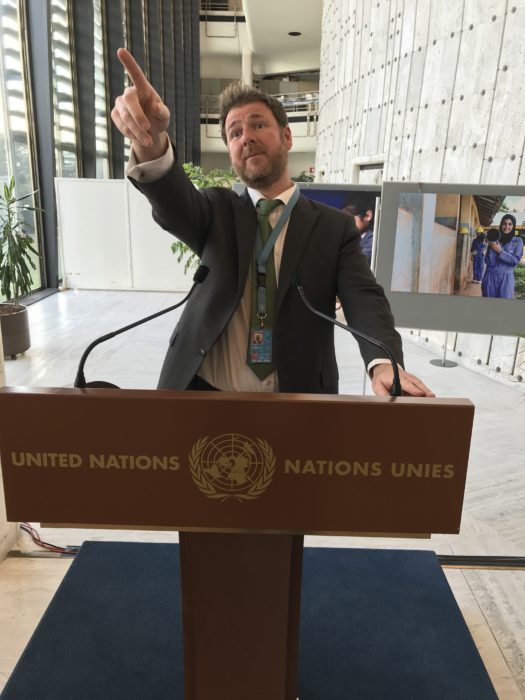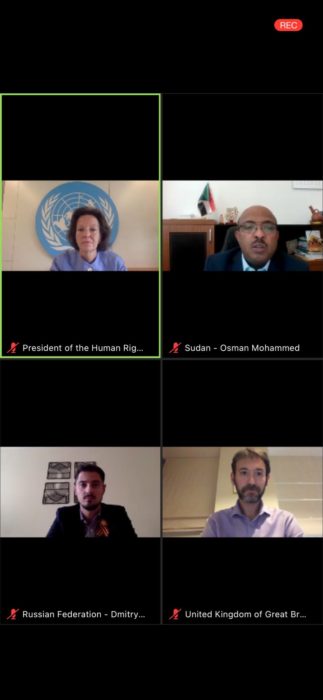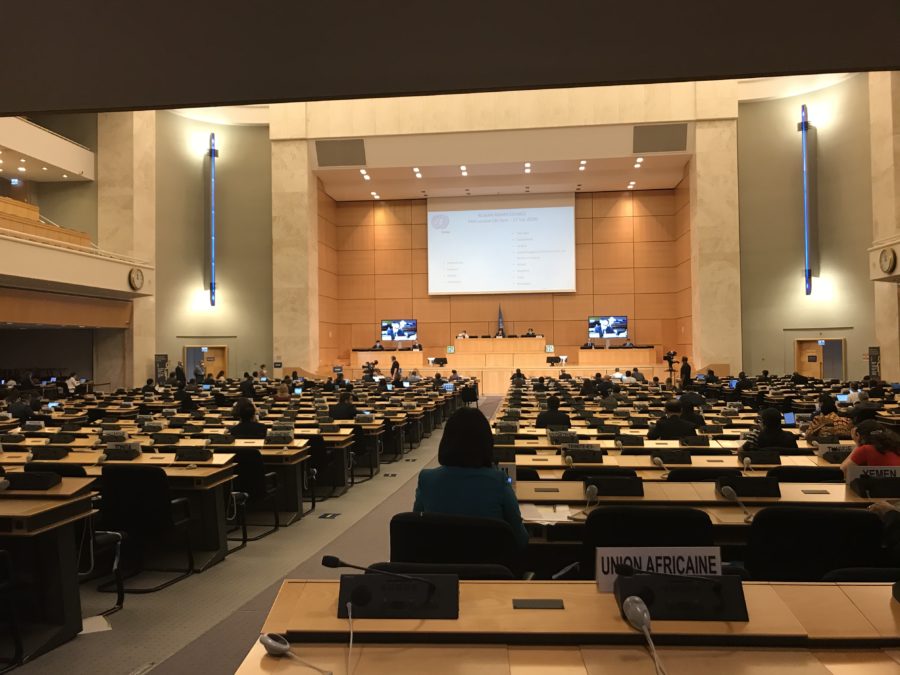Deputy Head, UK Mission Political Team
30th July 2020 Geneva, Switzerland
Councils Completed 
These are such strange days. We still don’t know if this will prove to be a painful but relatively short-lived episode of global distress or if we’re in this for the much longer haul. Will we look back on this as a defining moment of international cooperation to overcome one of the greatest health challenges in human history? Or will future evolutionary palaeontologists look back on this period with fascination, as the point at which humans began to develop opposable digits on their elbows to overcome tricky door handles without using their hands?
Since the Council went on hold in March, the world has become so profoundly different in so many ways that I’ve been finding any element of pre-COVID familiarity quite comforting. So having the Council go about its business over the last two months has been reassuringly exhausting.
For those who haven’t been following closely, while much of the multilateral system has been in deep sleep mode, the Human Rights Council has kept itself very busy. When physical meetings weren’t possible in April and May, Council President Elisabeth Tichy-Fisslberger of Austria, impressively, and improbably, secured consensus on a Presidential Statement to ensure that the profound human rights implications of COVID-19 would receive due attention. The text highlighted important guidance by the UN Secretary General and the High Commissioner for Human Rights stressing the need for states to respect human rights during their responses to COVID-19. And more importantly, it requested the High Commissioner to report back on what states have been doing at future sessions of the Council.

COVID-19 has prompted a global human rights crisis alongside the health crisis and the Council’s experts have been consistently outspoken about the ways in which rights have been neglected, or actively repressed under the pretext of responding to the global pandemic. The UN system has a vital role in holding states to their human rights obligations at time when so many people are living in conditions of heightened vulnerability.
President Tichy-Fisslberger and her team of Vice-Presidents then brokered agreement on getting the Council back to work in mid-June to complete the suspended March session. Important resolutions were adopted to maintain scrutiny on the likes of Iran, Syria, Myanmar and North Korea. But the main talking point was the urgent debate held following the killing of George Floyd, focused on racially inspired human rights violations, systemic racism, police brutality and violence against peaceful protesters. The debate included a powerful call for accountability by George Floyd’s brother and led to a consensual resolution focussed on systemic racism in law enforcement across the world.
This has proved to be a long-overdue moment of awakening for so many people and the impacts of recent events will clearly reverberate for a long time to come. Within my own office, it has been heartening to see colleagues come together to work out how we can be much more actively anti-racist in all areas of our lives.
There was little time to draw breath before the Council was back for its June session. It opened with a heavy focus on China who had arranged a last-minute video appearance by Hong Kong Chief Executive Carrie Lam to pre-emptively respond to criticism about the new security law imposed on Hong Kong. The law gives China control over internal security in Hong Kong in clear violation of the UK-China joint Declaration, an international treaty registered with the UN. The implications for the rights of people in Hong Kong are grave. A cross regional statement delivered by the UK and supported by 28 countries, expressed concern over Hong Kong, and China’s ongoing repression of Uighurs and other minorities in Xinjiang, which remains one of the most disturbing cases of mass human rights violations anywhere in the world. Fifty of the Council’s experts have expressed deep concern about China and ongoing international attention to both Hong Kong and Xinjiang are essential.
Due to distancing rules the Council room was sparsely populated, and meeting restrictions meant the session was a long way from normal. Nevertheless there were impressive results on resolutions on Responsibility to Protect, Discrimination Against Women, Freedom of Expression and Peaceful Protests, as well as strong outcomes on the country resolutions on Syria, Belarus and Eritrea. Well done to all involved.

One of the worst things about my job is constantly having to say goodbye to many excellent people. Since March, the equally peerless Moses Rugema from Rwanda and Ana Brito from Portugal have headed for pastures new, and many more will join the traditional summer exodus.
But there’s one person I’ll miss more than most. My colleague Chris Lomax came to Geneva for a three-year posting in 2009 and somehow wangled an extra eight years living out here. I asked him to write some farewell lines but his response was typically direct and betrayed his fondness for some of the stronger Anglo-Saxon vocabulary. So sadly we’ll have to do without hearing from the man himself. He leaves a legacy that will long outlast him, especially his work on many of the most difficult situations in Africa. He worked in partnership with Somalia on repeated cooperative resolutions, ensured the Council maintained a strong but consensual focus on South Sudan and played a key role on major resolutions on Libya, DRC and Burundi. But his biggest impact has been on Sudan, where a combination of pressure and engagement has led to the Sudanese Government opening a major OHCHR country office to help it move forward following decades of serious violations. The Council has much to thank you for Chris.

For anyone due to be replaced before the September session, or just looking for light summer reading, you might like this new guide called Peacocks and Procedure. It’s by Australian maestro Ben Lee and yours truly and aims to give a crash course for anyone about to take their first steps in the Council. I hope you find it helpful and wish you all a restful and healthy August.














